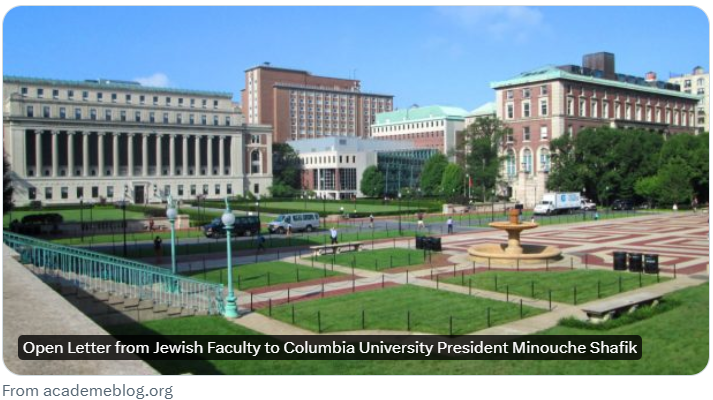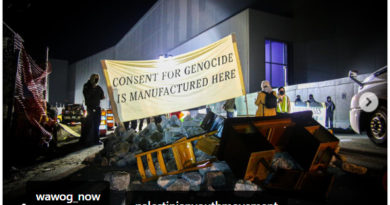Open Letter from Jewish Faculty to Columbia University President Minouche Shafik
This is an excerpt of a letter that was sent out before the recent repressive escalation and the revelations of FBI involvement in the Columbia repressive measures against the anti-Genocide movement there. You can read in full at this link. A shorter version of this statement is at this link. Hopefully Rutgers faculty of the Jewish faith can also come up with a similar statement but in the Rutgers context. Rutgers is facing hearing before the same smear committee. Also hopefully the Rutgers hearings will not trigger a potentially violent wave of repression as seems to be unfolding now in the wake of the Columbia U round of hearings. – Ed.
POSTED BY HANK REICHMAN
On Wednesday, April 17 when faculty members nationwide will be observing a National Day of Action for Higher Education, Columbia University President Minouche Shafik is scheduled to testify before the House Education and Workforce Committee. On December 5, that committee heard testimony from the presidents of Harvard, MIT, and the University of Pennsylvania, with disastrous results. On April 5, a group of 23 Columbia Jewish faculty members sent the following open letter to President Shafik. A revised and shorter version of the letter was published April 10 in the Columbia Daily Spectator. Columbia faculty, staff, students, alums, and parents may read and sign the April 10 statement here.
April 5, 2024
To: President Minouche Shafik, Columbia University
Cc: Prof. Angela V. Olinto, Provost, Columbia University
Felice B. Rosan, General Counsel, Columbia University
Prof. Dennis Mitchell, EVP of University Life
Prof. Jeanine D’Armiento, Chair, Executive Committee, Columbia University Senate
Prof. Matt Hart, Chair, Policy and Planning Committee, Faculty of Arts & Sciences
Laura Rosenbury, President, Barnard College
David Greenwald and Claire Shipman, Co-chairs, Columbia University Board of Trustees
Cheryl Glicker Milstein, Chair, Barnard College Board of Trustees
Dear President Shafik,
We write as Jewish faculty at Columbia and Barnard in anticipation of your appearance before the House Education and Workforce Committee of Congress, where you are expected to answer questions about antisemitism on campus. Based on the Committee’s previous hearings, we are gravely concerned about the false narratives that frame these proceedings and that function to entrap witnesses within them, and we wish to offer our support and input.
When a member of Congress with a history of espousing white nationalist politics – Rep. Elise Stefanik – calls university presidents to account for alleged antisemitism on their campuses, we see these proceedings for the disingenuous political theater that they are, and we object to your now being cast as a villain in this political theater of a new McCarthyism.
The real purpose of these hearings has been to rehearse and amplify decades-long bad-faith efforts to undermine universities as sites of learning, critical thinking, and knowledge production. The lawmakers who questioned college presidents in December made such intentions clear from the start. In her introductory remarks, the chairperson, Rep. Virginia Foxx, condemned universities for “assenting to the race-based ideology of the radical left” and charged that “Institutional antisemitism and hate are among the poisoned fruits of your institution’s cultures.” South Carolina Representative Joe Wilson brazenly piled on, slamming universities as “illiberal sewers of intolerance and bigotry,” a condition caused, he declared, by diversity and inclusion initiatives; Foxx, absurdly, cited as evidence of antisemitism the existence of courses at Harvard like one called “Race and Racism in the Making of the United States as a Global Power.”
In other words, the hearings proceed from a spurious premise – that academic study of race (as well as other fields in the crosshairs of culture warriors, like gender and sexuality), have noxiously polluted campuses. From there, they assert that this pestilent culture has caused antisemitism to thrive. Thus they attempt to establish two falsehoods as fact: that critical study of complex historical truths leads to antisemitism and that antisemitism is rampant on campus. This reasoning is a closed loop; one can’t refute it from inside its mendacious logic.
Though antisemitism functions as the Committee’s current engine of outrage, their purpose is not to assure that Jewish students can flourish on campuses. Rather, it is falsely to caricature and demonize universities as supposed hotbeds of “woke indoctrination.” This depiction opens the way to political interference at every level – from the appointment of like-minded cronies to boards of governors to fingering specific books for banning from syllabi – as has been happening in states like North Carolina and Texas. Florida’s university system has endured so much politically-driven intervention – even to the point of taking over a liberal arts college – that the AAUP has concluded, “Meaningful Higher Education in Florida May Not Survive.” While such ruinous meddling has so far taken hold at public universities, the House Education and Workforce Committee has now declared open season on private ones as well.”
Read full statement at this link .
Skipping down to concluding remarks:
As faculty of Columbia and Barnard, as committed teachers of our students, and as invested stewards of the institution who care deeply for its present and its future, we stand with you against these attacks against not just our University but all universities and colleges, and we stand ready to support you in this work however we can.
Sincerely,
Debbie Becher, Barnard College
Helen Benedict, Columbia Journalism School
Susan Bernofsky, School of the Arts
Elizabeth Bernstein, Barnard College
Nina Berman, Columbia Journalism School
Amy Chazkel, Faculty of Arts & Sciences
Yinon Cohen, Faculty of Arts & Sciences
Nora Gross, Barnard College
Keith Gessen, Columbia Journalism School
Jack Halberstam, Faculty of Arts & Sciences
Sarah Haley, Faculty of Arts & Sciences
Michael Harris, Faculty of Arts & Sciences
Jennifer S. Hirsch, Mailman School of Public Health
Marianne Hirsch, Faculty of Arts & Sciences (Emerita)
Joseph A. Howley, Faculty of Arts & Sciences
David Lurie, Faculty of Arts & Sciences
Nara Milanich, Barnard College
D. Max Moerman, Barnard College
Manijeh Moradian, Barnard College
Sheldon Pollock, Faculty of Arts & Sciences (Emeritus)
Bruce Robbins, Faculty of Arts & Sciences
James Schamus, School of the Arts
Alisa Solomon, Columbia Journalism School









